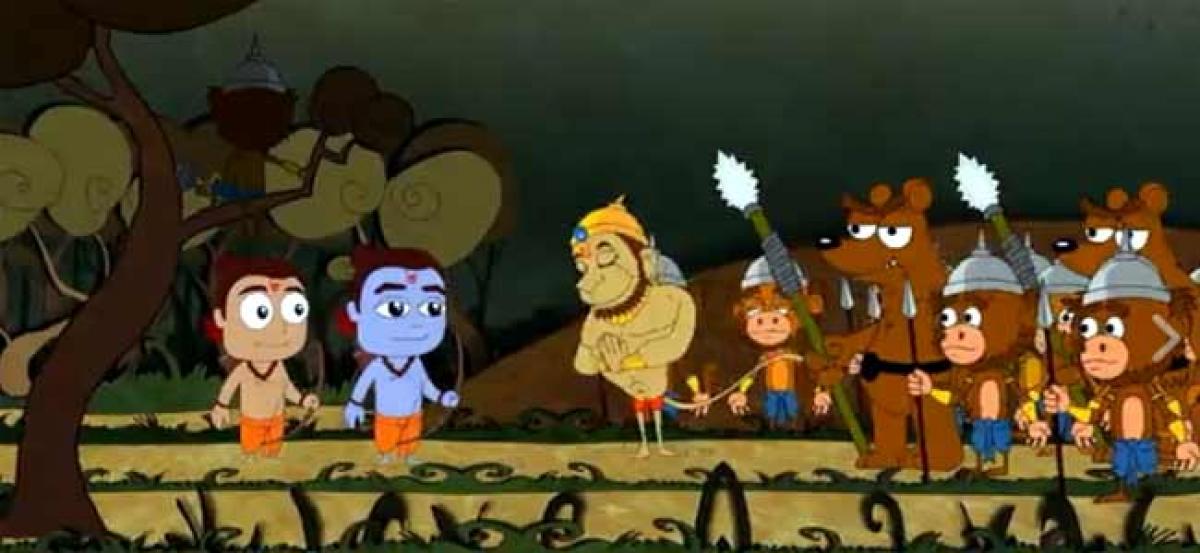Live
- GMR Airports Unveils AI-Powered Digital Twin Platform to Transform Airport Operations
- India poised to become leading maritime player: PM Modi
- Top Causes of Kidney Stones and How to Recognize Silent Symptoms
- India’s renewable energy capacity logs 14.2 pc growth at 213.7 GW
- Winter Session of Odisha Assembly adjourned sine die
- Biden calls Trump's tariff approach 'major mistake'
- After Drama Over Eknath Shinde’s Chief Minister Race, Maharashtra Cabinet Formation Faces New Tensions
- Egyptian FM, Blinken discuss recent developments in Syria
- Iran's supreme leader says Syria's developments result of US-Israeli 'plot'
- Elon Musk to Purchase $100 Million Luxury Mansion Next to Donald Trump's Mar-a-Lago, Report Reveals
Just In
Mythology for young children - a great way to connect with our rich heritage


Storytelling is the most powerful learning technique for young children. Stories seek to inform, educate and entertain children. More importantly stories get children to ask questions, encourage curiosity, impart life values or give cultural perspectives on history, world around them etc.
Storytelling is the most powerful learning technique for young children. Stories seek to inform, educate and entertain children. More importantly stories get children to ask questions, encourage curiosity, impart life values or give cultural perspectives on history, world around them etc.
Stories for children can be fairy tales, mythology, folk tales, legends, fables and so on. At schools we tend to expose our children to stories that are mainly didactic. Stories that impact morals, good values and positive world views tend to dominate what children learn at school. This also means that myths, which tend to be based on religion, or have complex story plots tend to get left out of curriculum. It is then exposed to children through the initiatives of parents, storybooks, videos or apps, other out of school interactions that the child has.
Indian mythology helps convey the historical perspective, a sense of belonging, models for good behaviour, the concept of dharma, moral lessons, value and virtues. Myths are also fundamentally God-lore – as against legends that are stories of humans. Hence the power of persuasion of myths is much stronger than other story formats. Exposing children to the key Itihasas – Mahabharata and Ramayana; the thousands of stories that are within the puranas, the stories behind the key religious festivals we celebrate in India like Holi, Dusshera or Diwali are all valuable life lessons for children.
Stories of Ramayana impart values being truthful and righteousness even though that path is difficult; Mahabharata helps children understand sense of fairness, loyalty among others; Krishna stories impart values of bravery, helping others. Myths help explain the historical and shared beliefs of our culture and society such as our cultural beliefs of the origin of universe, the social order in our societies, instil a sense of awe about life and even guiding children towards spiritual enrichment.
The challenge in mythology stories tend to be that they need to be curated and even sanitised sometimes in conveying them to children. Myths can have violence, have conflicting messages, be scandalous, be patriarchal and don’t necessarily have happy endings. We come across several parents who do not expose their children to the popular myths till they are much older for these reasons.
However, myths also perform a very important role of conveying the bitter-sweet truths about life in a safe environment of storytelling. These days there are so many learning apps for children are available. These help children learn about mythology through curated videos. The parents need to encourage children to read myths and use these as opportunities to discuss values, morals, conflicts with them actively. With great animated videos, these apps brings to life the myths in a rich way –how they depict the heroes, characters and the plots. The videos with their voice over, spoken in English and regional languages also help the child learn language skills. Particularly for small children, who are in the process of acquiring critical language skills of Listening, Speaking, Reading and Writing – encouraging them to narrate these stories in their words helps strengthen the language skills significantly.
This Children’s day lets celebrate the joys of childhood while imparting the rich heritage of Indian myths to our children.
-Badri Sanjeevi, CO Founder & CEO Appystore.
By Mr Badri

© 2024 Hyderabad Media House Limited/The Hans India. All rights reserved. Powered by hocalwire.com






